
Hearing people complain about how their energy levels are low is fairly commonplace: “I’m maxed out… I’m so tired after lunch… I always fall asleep on the way home or in front of the TV.”
And that was before the pandemic, since which time there have been countless reports about how fatigue, energy levels and burnout are an increasingly common problem. Whether working from home or back in the office, people are simply feeling more tired and the consequences for our health and performance are significant.
Two dictionary definitions of burnout are:
physical or mental collapse caused by overwork or stress
zero fuel left in the tank – all used up
The reference to fuel is interesting because energy is the fuel we run on and it’s a finite resource. You can see that clearly if you consider examples such as marathon runners, surgeons and long distance lorry drivers: once their energy is depleted, that’s it, they can no longer perform at a desirable level.
These might seem like extreme examples, but the reality is that whatever our role or situation, for us to function well, we need to manage the energy we have. If we don’t, the impact of running low and running out of fuel is entirely predictable...
Our health and resilience suffers
When we are tired a great deal, our body doesn’t repair so well, our immune function is less robust so we get ill more often. Mentally and emotionally, we can find it harder to lift ourselves up out of bad moods, so we become less resilient to the knocks and challenges we face every day.
Our performance suffers
When running low on energy, our brain doesn’t function at its best level and key areas that suffer are levels of concentration and creativity, our ability to solve problems, even make good decisions.
There are many reasons why our energy levels might be low, here is a list of the main culprits:
Stress
Diet
Overwork
Screen time
Alcohol, tobacco, drugs
Sleep
1. Stress
When we find it difficult to manage the challenges and pressures that life throws at you, when you can’t cope as maybe you used to, your energy levels are impacted. Your general health, both physical and mental will use up your energy as your body diverts its resources to protect itself.
Doctors are now prescribing exercise, yoga, meditation and mindfulness to combat stress and even depression. Countless pieces of research show that these practices are scientifically proven to reduce stress, improve mood, sleep, memory, resilience and increase levels of energy.
Below are three simple exercises designed to help reduce stress and increase energy. Try even just one for three minutes and I am sure you will feel an immediate, positive change. Regularly practicing them will build your resilience and make a demonstrable difference to how you feel.
Yoga And Meditation Enhance Energy Levels
With so much of a typical day spent getting tired in front of a computer screen, yoga is a great antidote, a quick, simple, free way to get more energy. Yoga increases the flow of blood to the brain and the muscles throughout your body.
Moving your body releases endorphins that improve mood, feelings of wellbeing and vitality. It also reduces stress levels and helps you attain an optimal level of cortisol, known to sap energy.
Exercises that increase strength and flexibility in the spine are particularly beneficial to release blocks of energy. As are breathing exercises that increase oxygen flow and expel toxins such as carbon dioxide from the lungs. Try these!
Exercise a: Shoulder raises
Inhale and raise your left shoulder up to your ear, exhale and raise your right shoulder as you relax your left shoulder down. Continue for a minute and then change the breath, inhaling your right shoulder up and exhaling your left shoulder up. Continue for another minute and then change to double shrugs, inhaling both shoulders up, exhaling and letting them drop. Not only does this exercise release tension from your shoulders and neck, but it also increases the flow of blood to your brain
Exercise b: Fist/arm raises
Start with both hands in fists near your shoulders. Inhale and raise your left arm up to the diagonal, then exhale and bring it down to the starting position. Do the same with the right arm. Then inhale both arms up vertically over head and exhale them both down to the starting position. This is an energising exercise that massages the muscles in your shoulders and upper back.
Exercise c: Push/pull hands
Raise your arms up parallel to the ground, palms forward so your fingers point up to the ceiling. Alternately push forward and pull back as if trying to push the air in front of you. Make the pull back as important as the push forward. Co-ordinate the movement with your breath so one hand is pushing forward on the inhale and the other hand is pulling back on the exhale. Do the exercise with your eyes closed for a deeper internal experience and to cut out visual noise and distractions. As you swing your shoulders you should be able to feel a churning to your rib cage, which massages your internal organs.
2. Diet
What you eat and drink is key to healthy energy levels and you probably already know what's likely to help and what’s likely to hinder, but here’s a reminder: when you need a boost during the day, reach for an apple or banana, which have been shown to be as effective as energy drinks. Consider the top sportspeople who will eat bananas to keep energy levels up during a match. A coffee and chocolate bar may be delicious and will give you a quick burst of energy, but the effect is short lived; instead, try nuts and seeds that have the protein and slow release of energy to work better for you. Basically, foods with refined sugar work against your body, they ultimately make you sluggish, like putting the wrong petrol in your car.
Drinking water is absolutely essential to regulating the functions of our body, so stay hydrated by drinking around 1.5 litres of water every day. This excludes other liquids such as tea or juice. Schools and universities now promote the idea of drinking water in class and exam rooms because it has been shown to help concentration and brain function.
3. Overwork and screen time
I’m not here to tell you to work less (!), but I would like you to consider the following:
research shows that 90 minutes is an optimal length of time for us to work on any task before our energy starts to flag. That’s the time to take a mini break. This approach is more productive than simply ploughing on. A mini break can last just 5 minutes – surely you can spare 300 seconds? Getting up from your desk and going for a walk is the perfect mini break, because the gentle exercise results in an increased flow in oxygen, a relaxation of your eye muscles and the change in pace actually increases your energy while putting the brain into neutral, which can stimulate innovative thinking. If you can’t go out for a walk, simply walking around your home or in the office will do the job.
Then there’s being able to switch off at the end of your work day. Our brains benefit from having the time to rest and recharge, not to be occupied by worries or responsibilities 24 hours a day. Of course if you’re on call, you’ll respond to messages, but it’s the casual glance to see what emails have come in and the attitude that says “it won’t harm to send a few replies, it’ll save me time in the morning”, that is actually harmful. It’s an unhealthy work practice that has increased dramatically since the pandemic and the prevalence of multiple mobile devices and communications platforms. Your brain needs rest in the same way your body needs rest.
4. Alcohol, tobacco, drugs
You might use them to relax but they all stimulate the body in ways that raises blood pressure and uses up energy. After the initial buzz, booze dehydrates and has an energy sapping, sedative effect.
As with most things in life, used in moderation is OK for most people. But when you rely on them for relaxation or pleasure, you are actually draining the body’s energy resources.
5. Sleep
A good length of quality sleep is the number one way that our brains and bodies rejuvenate energy and heal injuries. So if you want more energy and to be healthier, you need to sleep better. Of course that’s not always easy but here are a few tips for how to enjoy a good night’s sleep:
Routine – going to bed around the same time every day, even weekends, has been shown to have a significant effect on the quality of sleep we get. As does waking up at the same time.
Preparation – stop eating several hours before bed, avoid sugary and spicy foods and alcohol, which might make you feel sleepy but it actually gets in the way of the quality sleep needed to recharge your batteries; do relaxing things – have a bath, read a book or magazine, do some gentle exercise.
Environment – your room should be dark, quiet, not too warm, without a phone charging by your bed.
If you would like to find out more about the subject of energy and how you can have more of it, please contact nick@nickyogameditation.co.uk or call +44 (0) 787 966 6921
FAQs
Question: What causes a lack of energy?
Answer: The main reasons why your energy levels may be low will include: Stress becoming overwhelming; Diet not balanced to provide sustained energy levels; Workload too much to allow proper down time; Screen time excess causing information overload; Alcohol, tobacco and drugs using up the body’s energy and affecting sleep quality; Sleep quantity and quality not enough for body and mind to rejuvenate and heal.
Question: How do you overcome lack of energy?
Answer: There is no quick fix answer to this question and there is no single, simple solution. It is a combination of all these ingredients: less stress, better diet, manageable workload, less screen time, alcohol, tobacco and drugs, better sleep. These involve lifestyle changes so the input needed to achieve the desired output will take time and persistence.
Question: Does stress at work affect your work-life balance?
Answer: The Cambridge Dictionary defines work-life balance as ‘the amount of time spent doing a job, as compared to the amount of time spent with your family and on things you enjoy.’ The average person spends around half their time at work and half their time at leisure. The problem with stress is that it negatively impacts ALL your time, not just the hours spent at work, affecting mood, sleep, energy, health, relationships and more. So keeping stress under control is vital to a healthy and happy balance in life.
Question: How does meditation help relieve stress?
Answer: When you meditate, your heart rate and blood pressure drop, your adrenal glands produce less cortisol, often referred to as the stress hormone. Meditation helps you relax, a place from which both body and mind can repair and rejuvenate. It is easy to do and has no negative side effects.
Question: How much sleep do we really need to work productively?
Answer: Acclaimed sleep researcher, Daniel Kripke, found that “people who sleep between 6.5 and 7.5 hours live the longest, are happier and most productive”. He explains that sleeping either fewer or more hours can be equally harmful. We are all different, some function better than others on less sleep, so be mindful how you are feeling: energised or sluggish? Quality is as important as quantity so please look at the tips above.
Question: How does the energy from Yoga help transform you?
Answer: This is not easy to describe but very easy to experience! Yoga helps you become a better version of who you are already, by breaking old, unhealthy patterns, giving you a sense of calm and clarity while making you both physically and emotionally stronger, more resilient and flexible.


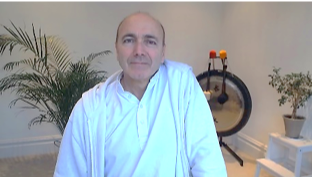
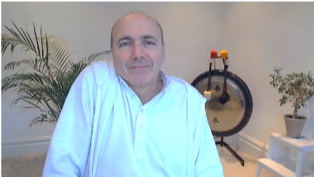
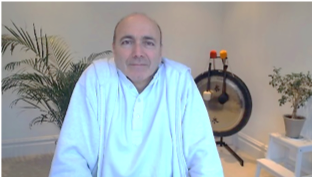
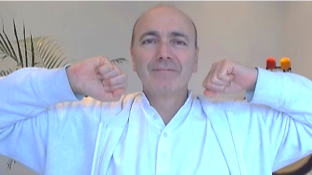
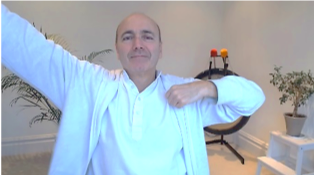
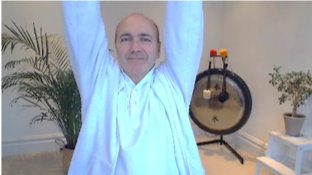
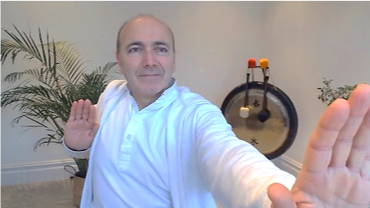
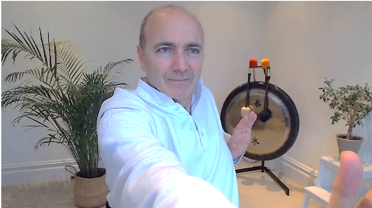
Comments